 MyDogBreeds
MyDogBreeds Sarplaninac is originated from Macedonia but Kintamani is originated from Indonesia. Sarplaninac may grow 7 cm / 3 inches higher than Kintamani. Sarplaninac may weigh 28 kg / 62 pounds more than Kintamani. Both Sarplaninac and Kintamani has same life span. Both Sarplaninac and Kintamani has almost same litter size. Sarplaninac requires Moderate maintenance. But Kintamani requires Low maintenance
Sarplaninac is originated from Macedonia but Kintamani is originated from Indonesia. Sarplaninac may grow 7 cm / 3 inches higher than Kintamani. Sarplaninac may weigh 28 kg / 62 pounds more than Kintamani. Both Sarplaninac and Kintamani has same life span. Both Sarplaninac and Kintamani has almost same litter size. Sarplaninac requires Moderate maintenance. But Kintamani requires Low maintenance
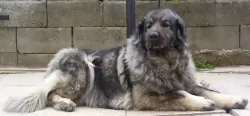 Hailing from Macedonia, the beautiful Sarplaninac dog was developed as a guardian of livestock and is large enough to fight off large predators like bears and wolves.
Hailing from Macedonia, the beautiful Sarplaninac dog was developed as a guardian of livestock and is large enough to fight off large predators like bears and wolves.
Nobody is too sure of the breeds exact origins, though it is thought that its ancestors came to the Balkan Peninsula with people migrating from ancient Asia.
This huge dog is one of the oldest native breeds from ancient Molosser breeds. The dog was recognized in 1939, and in 1954 it became known as the Yugoslav Shepherd Dog. Later the name changed and the dog was recognized by the United Kennel Club in 1995.
 The Kintamani dog is an ancient cross-breed and hails from Bali Island, Indonesia.
The Kintamani dog is an ancient cross-breed and hails from Bali Island, Indonesia.
The beautiful dog is classified into the working dog group.
It isn't sure how the dog developed, and it is believed that local Balinese feral dogs might have had a show in with bring the breed about. There are many stories regarding the origination of this breed but in 2006 the dog got recognition in Bali under the category 'distinct' dog breed.
There are efforts to see the Kintamani dog get global recognition.
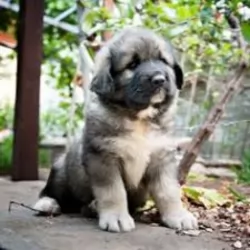 The Sarplaninac is a large, strong, fluffy dog standing at between 54 and 62cm in height and weighing between 30 and 45kg.
The Sarplaninac is a large, strong, fluffy dog standing at between 54 and 62cm in height and weighing between 30 and 45kg.
The coat of the dog is dense, coarse and of medium length. Colors are different shades of grey, white, tan and black. The head is large, the ears are fairly short but are floppy and covered with short hair. The dog is deep chested and the tail is long, often held high and covered with thick, feathery hair.
Protective, reliable, reserved, stubborn and gentle, this intelligent dog is fairly serious, and while he makes a devoted family pet, he is cool and wary of strangers.
Excellent training and socialization makes him well mannered, balanced and obedient around different people. He will tolerate children but won’t take easily to other pets in the house, capable of becoming aggressive with them.
 Looking quite a bit like the Malamute, Chow and Samoyed, the Kintamani is a medium sized dog and has a broad face, erect ears, dark-brown eyes and a thickly plumed tail that is essentially held high.
Looking quite a bit like the Malamute, Chow and Samoyed, the Kintamani is a medium sized dog and has a broad face, erect ears, dark-brown eyes and a thickly plumed tail that is essentially held high.
The Kintamani is a Spitz type dog with an attractive appearance. Standing at 40 to 55cm, the Kintamani weighs in at roughly 13 to 17kg. The colors of the medium to long haired coat are white, beige, black and even brindle, though less common.
Having an independent nature and being territorial, your Kintamani can become aggressive with other dogs. He is very loving and accepting of his human family members though, becoming very loyal to one favorite family member.
They're alert and curious and make good watchdogs. He is also fond of swimming and climbing so he makes a good sport companion.
He is an intelligent dog and he can be easy to train. He is strong-minded and an independent thinker, so training and socialization will rein him in a bit and make him obedient and amicable.
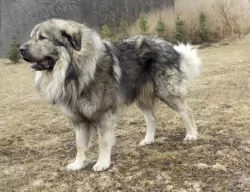 These dogs are protective, but they’re not vicious. When properly raised they are wonderful family pets.
These dogs are protective, but they’re not vicious. When properly raised they are wonderful family pets.
True, it’s a large, strong willed dog that isn’t a good choice for the first-time dog owner. They are good with children, but only children who have been taught how to treat animals with care and patience.
This dog is a powerful guardian type of dog, imposing in size, but it’s all about upbringing, and if you bring him up well then he can make a tremendous pet and companion.
 The Kintamani dog is an alert, bright, intelligent dog who will make you a good watchdog.
The Kintamani dog is an alert, bright, intelligent dog who will make you a good watchdog.
He also makes a companionable pet, and is friendly, loving and loyal to his human family. He has a social, lively temperament, and as people see what awesome pets they make, they are becoming more in demand as they are also easily trainable.
Do your duty towards this attractive dog and love and care for him like any other family member and he’ll be your most devoted best friend.
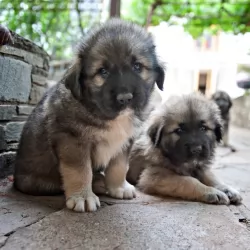 The Sarplaninac dog is a robust dog but he can suffer from health issues such as hip dysplasia, obesity, bloat, ear infections and skin allergies.
The Sarplaninac dog is a robust dog but he can suffer from health issues such as hip dysplasia, obesity, bloat, ear infections and skin allergies.
When your dog gazes up at you with such love in his eyes, don’t be tempted to pop some chocolate into his mouth or let him finish off your ice-cream. Treats like this can damage your pet’s health and give him heat intolerance, breathing difficulties, hypertension, liver disease and diabetes.
 You’re the only one who knows your dog, so you’re the one who will pick up signs that he isn’t well.
You’re the only one who knows your dog, so you’re the one who will pick up signs that he isn’t well.
You can tell a lot from your dog’s behavior, and often a dog that isn’t well will hide away in a corner. If you're worried about your pet’s health, get him to the vet for peace of mind.
Being a responsible dog owner requires you regularly performing body checks on your pet.
The canine parvovirus (CPV) infection is a very contagious viral illness that affects dogs. The intestinal form will have your dog vomiting, he won’t want to eat and he’ll have diarrhea.
The other less common type is the cardiac parvo where the heart muscle of a fetus is attacked, leading in all likelihood to death. Thankfully the incidence of the parvo-virus infection has been reduced by vaccination of puppies.
This is a tick-borne illness that is transmitted through deer ticks. It is a disease more typically seen in dogs from the northeast United States. Common signs of the illness are lameness, lethargy and enlarged lymph nodes. Most dogs respond well to antibiotic treatment.
Take a look inside your dog’s ears and check for itchiness, discharge and redness. Inside the dog’s ears it is very sensitive so if you don’t want to clean his ears, rather leave you vet to do it as you don’t want to perforate your dog’s eardrums.
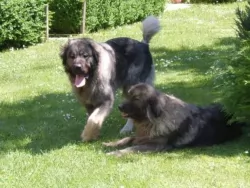 Every dog needs care from puppyhood through to old age.
Every dog needs care from puppyhood through to old age.
Šarplaninacs are looked upon as medium maintenance dogs. The coat is long and thick and requires a firm bristle brush to get their hair brushed.These dogs are moderate shedders so a brush twice a week will do the trick to keep the hair free of loose hair and matting.
Because these dogs have floppy ears, they will need to be checked and cleaned. Floppy eared dogs battle with moisture and wax build-up that increases the likelihood of ear infections.
Check the eyes that they are clear and free of discharge. Eyes with a lot of discharge can be indicative of health problems.
Check for any unusual lumps as cancer often starts with a new lump.
Provide your pet with a nice warm, dry place to sleep.
Keep his vaccines up to date to prevent deadly canine diseases.
Have him or her spayed or neutered if you don’t want puppies. These are regular procedures for a vet and offers health benefits for the dog. Neutering a male improves his character and keeps him from roaming. These dogs are capable of having 3 – 8 puppies.
The Sarplaninac requires decent food if he is to remain healthy. Dog’s stomachs can become upset if they eat all kinds of sweet and spicy human foods.
Commercially manufactured dog food is a good backup food to have because of its convenience. Try to include some home-made food. Simply add into one big pot chicken, brown rice or pasta and spinach, sweet potatoes and carrots. This food can all be chopped up and added in to the dry kibble twice a week. Give this to your pet twice a week and see how his tails wags when he smells it.
Also try to add in some raw meat to his food occasionally.
Ensure there is always a bowl of fresh, cool water within his reach.
 The thick, lustrous coat of the Kintamani will need to be brushed twice a week because the coat is capable of getting burrs in. He sheds, so to keep the coat lustrous you want to be brushing him twice a week to remove all those loose hairs.
The thick, lustrous coat of the Kintamani will need to be brushed twice a week because the coat is capable of getting burrs in. He sheds, so to keep the coat lustrous you want to be brushing him twice a week to remove all those loose hairs.
The dog can adjust to life in the city or the countryside, but being energetic it is best that they have a reasonable sized garden or life on a farm. He will be quite happy with some good walks, but he'll want some more rough and tumble. He just loves joining you on a hike and climbing on rocks. These dogs are actually known for their climbing skills.
Kibble isn’t all equal, and dog owners have a huge choice, with the idea being to find the most nutritious one. Good food is key to good health for your Kintamani.
Your Kintamani puppy will require 4 meals a day. As he reaches adulthood you can start feeding him one or two meals a day.
The Kintamani has a beautiful thick coat and you want to ensure it stays that way by feeding him the best quality food there is. Top-quality dry food from a reputable brand will ensure balanced nutrition.
Read the packaging to ensure you’re giving him food that is appropriate to his age and for medium sized dogs. He will do well on some cooked chicken, brown rice, pasta and vegetables being added to this dry kibble every now and again as a treat.
If you’re unsure about whether he is getting the right kind of food in with a good balance of vitamins and minerals, you can always speak to your vet. Make sure that fresh, cool water is constantly available to him and wash his food and drink bowls regularly.